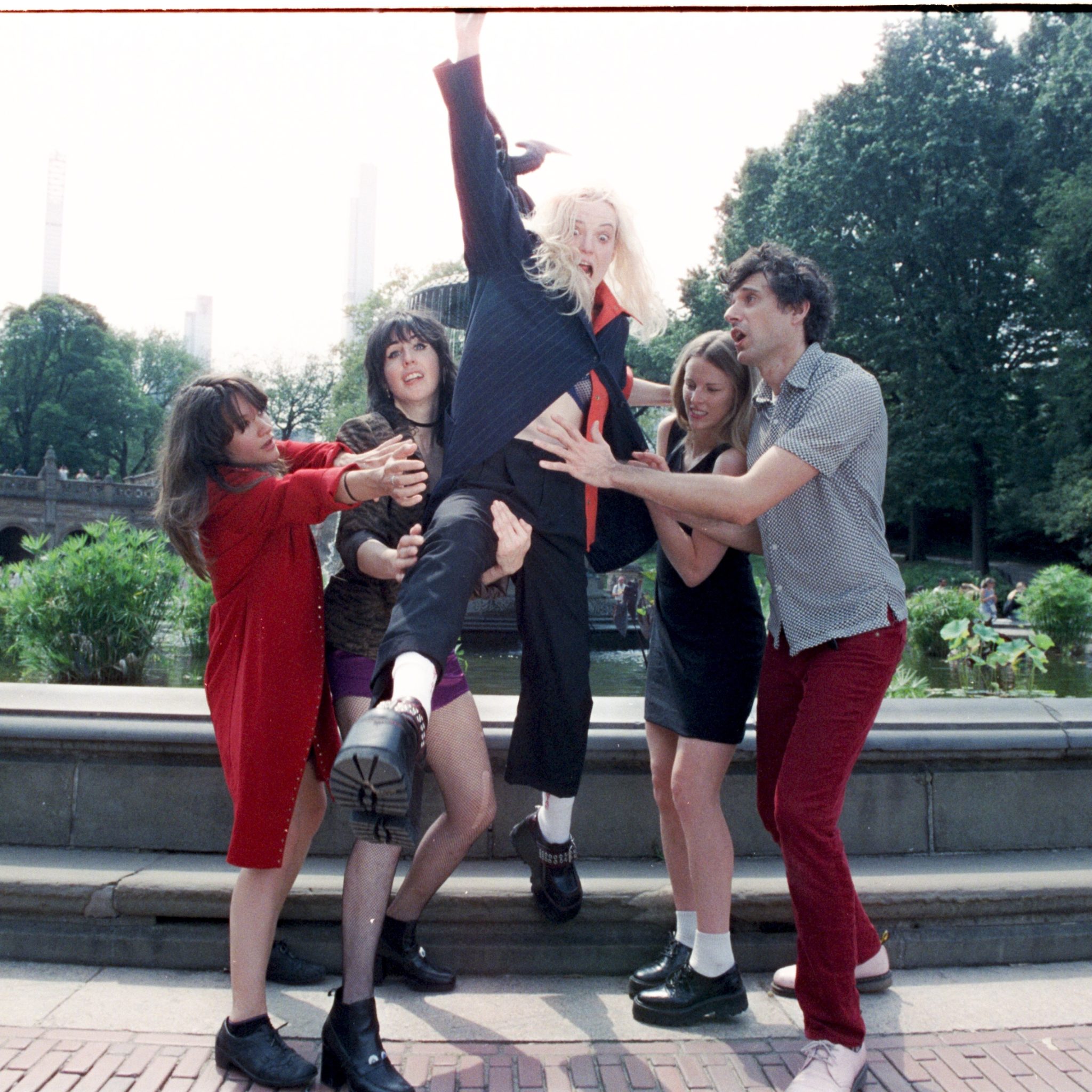Gustaf began without a name or, for that matter, many official members. In 2018, after someone’s tour bound for South by Southwest collapsed, Brooklyn musician Tarra Thiessen suddenly had a van headed to South by Southwest with no band in it. When she told friend Lydia Gammill about the conundrum, Gammill jumped at the chance to get in a now-empty van and head south with some songs she’d demoed. Friends were quickly recruited. Caution was instantly abandoned. And Gustaf—a devil-may-care quintet with the improvisational elan of their city’s No Wave forebears—was born.
During the next three years, four of the five folks who had climbed in that van without much notice, Gammill and Thiessen included, continued to climb atop any stage or into any living room space that would have them. Their charisma was clear in their slashing riffs, their call-and-response vocals, and their tricky drum-and-percussion tandem. When they released their thrilling debut, 2021’s Audio Drag for Ego Slobs, NME dubbed them one of New York’s most exciting new names—not bad for a band that, three years earlier, didn’t have one. Beck soon touted them as his new favorite group and remixed a track; they soon toured with the likes of Idles, Sleaford Mods, and Yard Act.
That first album, like Gustaf’s shows, was kinetic, fun, and loose, an invitation to shake off the absurdity of existence. Of course, a record with a handle like Audio Drag for Ego Slobs couldn’t be that straightforward or simple. Rather, Gammill was building a world inside of Gustaf, where a character—that being the previously mentioned Ego Slob—struggled to deal with their surroundings, to behave in a way where their emotions and actions didn’t alienate most everyone. But now, on Gustaf’s second album, the endlessly fascinating Package Pt. 2, that Ego Slob turns inward, wondering what they might change to make life, relationships, and love a little more manageable. If that sounds heavy or heady, well, it is; existence is like that, you know? But, importantly, Gustaf never sound heavy, choosing instead to spring forward like some dizzying post-punk dream, moving with the same irrepressible energy that made them.
Gustaf has long had a credo, reflecting their impromptu origins: There are no mistakes, just new arrangements. In conversation, it is something that everyone in the band—the aforementioned Gammill and percussionist Thiessen, plus drummer Melissa Lucciola, bassist Tine Hill, and guitarist Vram Kherlopian—readily acknowledges. That is an easy edict for a debut, of course, when no one has expectations. But it’s more challenging when people are paying attention, when a band has a sense of self and an album to build upon. So in February 2022, before a spate of tours, Gustaf headed into Brooklyn’s Studio G, putting down first takes that they could warp or try again when they returned from the road. They eventually did just that alongside Erin Tonkon, a friend who had worked on David Bowie’s Blackstar and with Richard Hell. Gustaf could now choose what sounded best, a process meant to ensure that the final version wasn’t too stiff, that it moved with the same elasticity that Gustaf has always treasured.
And Package Pt. 2 is a total joy to hear, with Gustaf in full command of a lineage that radiates from obvious touchstones like the B-52s and Talking Heads to DNA and Teenage Jesus and the Jerks. “Statue” makes a righteous prologue, with Gammill’s chants about taking up space at the center of the stage in order to ask complicated questions propelled by Lucciola’s throbbing drums and Kherlopian’s jarring riff. It’s tempting to chant along with “I Won” the first time you hear the song, its grievances guided by Hill’s incisive bassline and bolstered by Thiessen’s background vocals. It feels like an open invitation to vent. Don’t you wanna vent?
Where “Here Hair” is a brooding, slow-motion growl peppered by birdsong and stabbed by pinpricks of guitar, its chaser, “Hard Hair,” is a 45-second outburst, all energy and invective and regret. The shout-out-loud question and luminous hook of “Happiest Thought,” the push-and-pull dynamics of “What Does It Mean,” the rhythmic games of “Produce”: Package Pt. 2, is first and foremost, a magnetic rock album, Gammill’s speak-sing verses and uncanny hooks the tip of Gustaf’s colorful spear.
The hooks, riffs, and rhythms dig in instantly on Package Pt. 2. But it’s the larger questions Gustaf asks about how we deal with ourselves and one another that make these songs so repeatable, so that you can dig back into what they’re saying. “What Does It Mean” explores the internal cycles that drive us mad, that make us doubt we’re capable of anything. “Weighing Me Down” wonders how it is we know what we want in life and how we know when it may be ruining us. “I don’t lose time/It just moves forward,” Gammill intones with touches of menace and dread during “End of the Year,” the record’s stinging closer. “And I don’t lose my sight/It just stops working.” How are we—Ego Slobs, all of us—supposed to find our way to something better if we can’t even depend on our senses of self or the world?
Gammill will be the first to tell you that maybe that’s too much to consider for a rock album that’s this breathless and fun. Sometimes, she even wonders if she should mention it at all, but Gustaf was built in part to have fun thinking, shouting, and playing about our collective flaws. It’s at the very core. Indeed, like the best of their New York No Wave predecessors, Gustaf finds the space between the good-times rock gig and the late-night philosophizing that happens when it’s over. Sing along, read along, dance along: Package Pt. 2 works on whatever level you need it.
